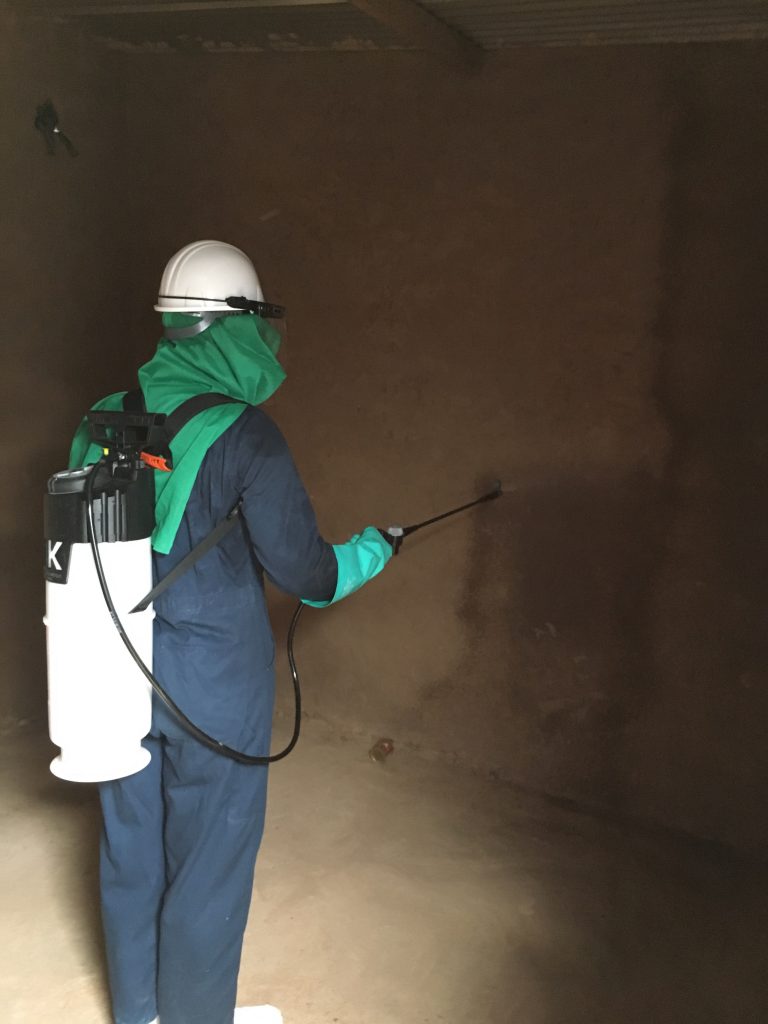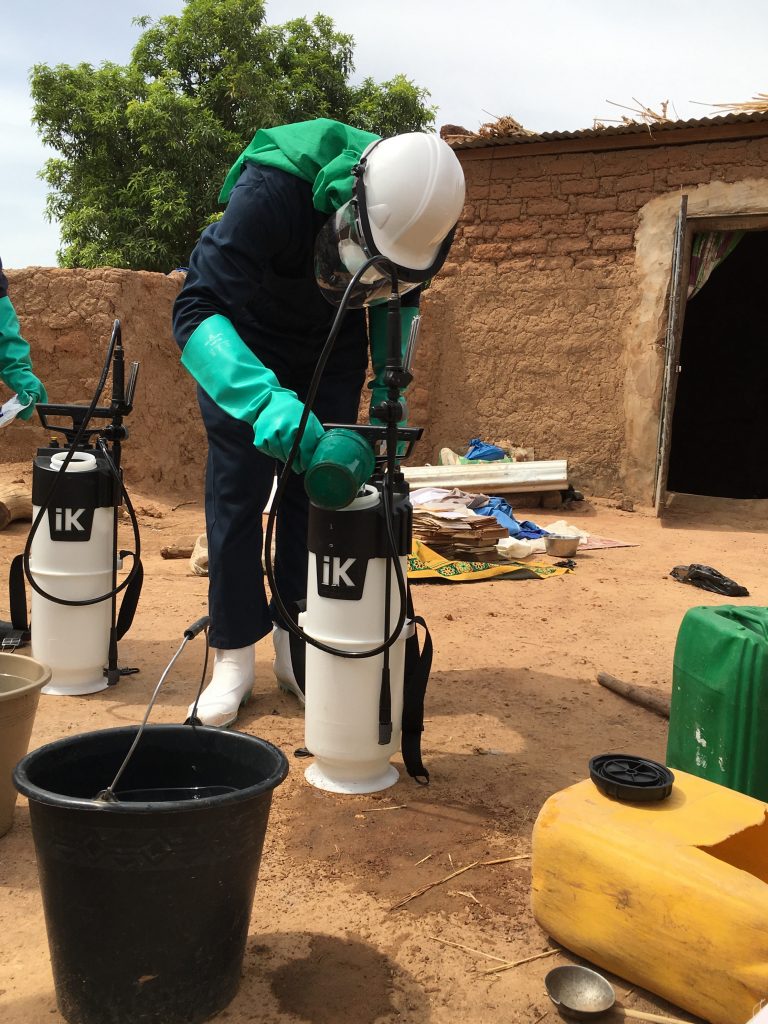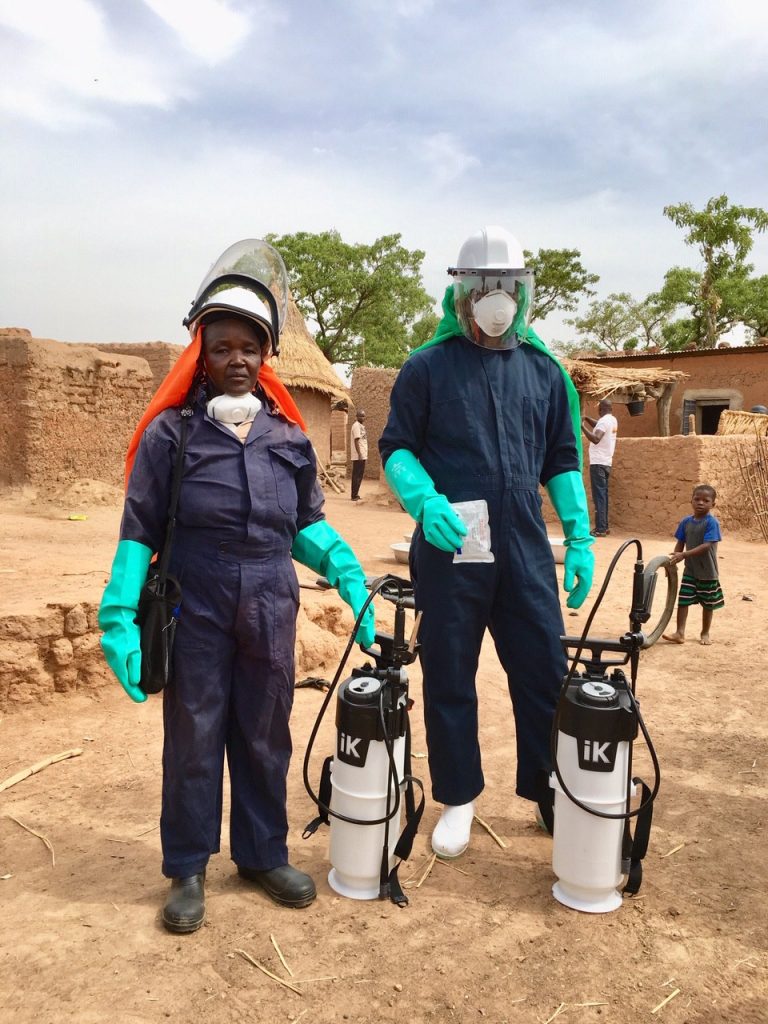
Burkinabe triplets receive insecticide-treated mosquito nets funded by PMI to protect them against malaria and other mosquito-borne diseases. Photo Credit: Allison Belemvire

For the first time, PMI is funding indoor residual spraying campaigns with the new insecticide clothianidin in five countries, including this campaign in Burkina Faso. Photos by Allison Belemvire, USAID/PMI
The mosquito may be small, but it is powerful. These insects can carry deadly and debilitating illnesses such as malaria, Zika, lymphatic filariasis, West Nile virus, chikungunya, yellow fever, and dengue. The mosquito’s ability to quickly infect and spread disease among millions of people each year makes it a top priority for the U.S. Government and partner countries.
For more than a decade, USAID and the U.S. President’s Malaria Initiative(PMI) have used insecticides to help fight mosquitoes. Over the years, preventive tools such as insecticide-treated bed nets have been highly effective at killing mosquitoes and protecting millions of lives.
But mosquitoes are becoming resistant to insecticides and our advantage over them is shrinking. This is why the U.S. Government believes it is critical to address insecticide resistance, which, according to PMI “is a serious threat to continued global progress toward ending malaria” and other mosquito-borne illnesses.
To respond to this challenge, USAID is finding new and innovative solutions to fight resistance, kill mosquitoes, and save lives.
Insecticide-Treated Nets (ITNs) are being reformulated with new insecticides to combat the resistance mosquitoes are developing to the standard nets. Previously, ITNs contained just one type of insecticide (pyrethroids). New ITNs combine a variety of insecticides or use new formulations, making them more effective.

For the first time, PMI is funding indoor residual spraying campaigns with the new insecticide clothianidin in five countries, including this campaign in Burkina Faso. Photos by Allison Belemvire, USAID/PMI
PMI along with the Global Fund to Fight AIDS, Tuberculosis and Malaria─for which the U.S. Government is the largest donor─are major buyers for these new ITNs and are helping create a more competitive marketplace for these innovations. While production of new ITNs is ramping up to meet growing demand, PMI is working with partner countries and other donors to prioritize where still-limited supplies of new nets should be distributed, taking into account where data shows high resistance to standard products and high malaria burdens. PMI is also funding susceptibility testing to ensure the new ITNs effectively kill local mosquito populations.

For the first time, PMI is funding indoor residual spraying campaigns with the new insecticide clothianidin in five countries, including this campaign in Burkina Faso. Photos by Allison Belemvire, USAID/PMI
Indoor Residual Spraying (IRS) coats the inside walls of homes with insecticide that is safe for humans but deadly for insects. This method has been highly effective in the past, but mosquitoes are growing resistant to the insecticides sprayed on the walls, just as they are to nets. For the first time, PMI is deploying the new insecticide clothianidin in IRS campaigns in Burkina Faso, Ghana, Madagascar, Mali, Côte d’Ivoire, and Tanzania. (It is the first novel insecticide to be introduced to the vector control market in nearly 40 years.) Formerly resistant mosquitoes are vulnerable to this new formula, ensuring that when they get knocked down they stay down.
These are just some of the many ways that USAID and PMI are working with countries to combat the challenge of insecticide-resistant mosquitoes. By rolling out new products and supporting a thriving market for innovation, we are transforming the way we confront mosquito-borne illnesses. The tiny mosquito may be strong, but together, we are much stronger.
A version of this story originally appeared on Medium
